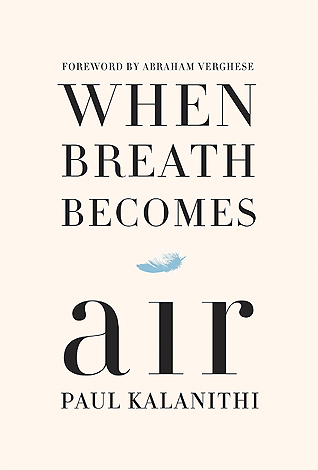 This is a book that I had seen many, many times in various contexts, but avoided like the plague. Why? Because it sounded depressing, that's why. The author, Paul Kalanithi, was finishing up his time as a chief resident in neurosurgery when he was diagnosed with extensive lung cancer, and then eventually brain cancer. Having struggled with life and medicine and the meaning of it all throughout his life and career, Kalanithi set out to make sense of his own life--and death--and purpose before the end came. You know all of this from the flap of the book, or the foreword at the very least. It sounded like a serious downer and possibly preachy as well, which was not a conversation I wanted to delve into. However, when I needed a book on death or grief for my reading challenge, it seemed like an obvious choice.
This is a book that I had seen many, many times in various contexts, but avoided like the plague. Why? Because it sounded depressing, that's why. The author, Paul Kalanithi, was finishing up his time as a chief resident in neurosurgery when he was diagnosed with extensive lung cancer, and then eventually brain cancer. Having struggled with life and medicine and the meaning of it all throughout his life and career, Kalanithi set out to make sense of his own life--and death--and purpose before the end came. You know all of this from the flap of the book, or the foreword at the very least. It sounded like a serious downer and possibly preachy as well, which was not a conversation I wanted to delve into. However, when I needed a book on death or grief for my reading challenge, it seemed like an obvious choice.I was very much surprised by this book. It's not religious at all, which I appreciated--a lot of people who aren't even really religious turn to it in the end--though it is deeply introspective. In his career as a neurosurgeon, Kalanithi worked with the brain which, he points out, ultimately contains the self. Part of this book looks at what makes life living--is it worth living if you have an injury or disease that takes away your language and ability to communicate? If it leaves you in a coma or a vegetative state? And in the process of coming to terms with his own death, he sees the people around him go through their own stages of grief--not only for him, but for things that they thought might be, especially when hope briefly seemed to be so close.
One thing that's worthy of noting is that the writing here is absolutely beautiful. Kalanithi certainly had a way with words, and his aspirations to spend the second half of his career--the half he never got to experience--as an author were certainly well-merited. He faces down some of the things that were piling up, such as a dissolving marriage that even most of his family wasn't aware of, the deep pain he was in all the time, and the terror he faced at leaving his life not fully lived, and turns it all into poetry. When I read the foreword and saw how Verghese lauded Kalanithi's writing, I had to roll my eyes. Surely the book couldn't actually be that good. And honestly, depressing as it sounds, it really sounded kind of gimmicky as well. But no, Verghese was right--the writing really is that good.
This is one of those books that it feels weird to say you enjoyed, because hey, does the average person really enjoy reading about a real person dying tragically? No, not really. But it was a wonderful book. Was it ground breaking in anything it revealed? No, not really. But just as Tuesdays with Morrie or The Last Lecture were sad books but lovely at the same time, so was this. It's not a book that's going to reveal the secrets of the universe. But it's a personal, insightful journey, and hey, you can learn some about neurosurgery to boot.
4 stars out of 5.
No comments:
Post a Comment